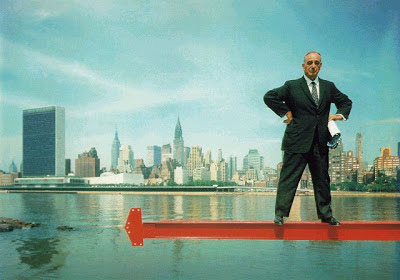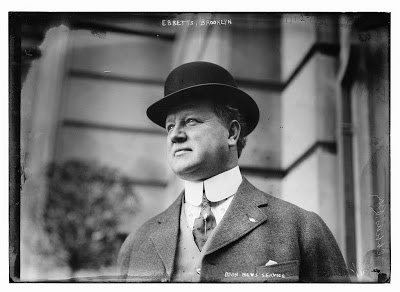Robert Moses
It's doubtful that anyone would debate whether Ebbets Field and the Brooklyn Dodgers were a good thing. Even today more than 50 years after the last Dodger game at Ebbets Field, positive memories of the ballpark and the ball club come like sorrows in Hamlet, "in battalions." For years the blame and the accompanying hostility fell pretty much exclusively on Dodgers owner, Walter O'Malley. More recently effective arguments have been made that Robert Moses was the major cause of the Dodgers departure. Elected officials in New York, especially New York City also bear some responsibility for allowing an un-elected, and therefore unaccountable official, like Moses to have so much power. Our just published book about Ebbets Field doesn't devote much space to the issue as the story has been told many times and our book is about Ebbets Field which wouldn't have survived even if the Dodger had stayed in Brooklyn. However the fan and player memories in the second half of the book don't lack for opinions and regardless of whether one comes down on one side or the other, there's plenty of blame to go around.
Walter O'Malley
For these purposes, however, the main point is that it didn't have to happen. Robert Moses may have been correct that the Fort Greene meat market was better suited for some other use, but he could easily have worked with O'Malley and the Dodgers to find another site in Brooklyn. Similarly O'Malley could have avoided the whole problem by taking another approach to the ball park site he already owned. The major reasons given for the inadequacy of Ebbets Field were the lack of parking and limited seating capacity. Yet today two of the most popular ballparks in major league baseball - Fenway Park and Wrigley Field, have little or no parking of their own and have somehow managed to solve similar seating capacity issues. Ultimately those owners found enough value in the existing site to find a way to make it work. O'Malley was a very successful owner, but he could have learned something from one of his predecessors, Charles Ebbets who did twice, what O'Malley couldn't do once - build a new home for the Dodgers. And Ebbets did so working with far less money.
Charles Ebbets
Again, regardless of how one allocates the blame, the end of the Ebbets Field and the Dodgers was (and still is) a tragedy because something good and valuable was lost when it didn't have to happen. In 1952 there were only 16 major league teams, by 1958 almost 1/3 of them had relocated to new homes. But in the other four cases, other than a small and devoted remnant, no one really cared, nor does anyone really care today. The Brooklyn story is different because so many people did care and became innocent victims of this tragedy. It's not something that anyone is likely to forget and is another reason why the memories of that historic ball park are so important and will never be forgotten.






